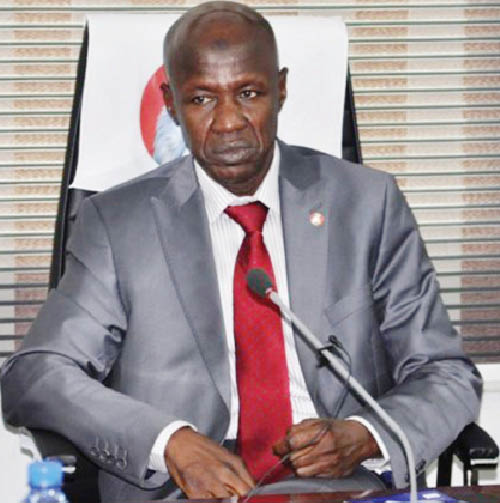Why Buhari should reject EFCC Act amendment – Lawyers
Lawyers have appealed to President Muhammadu Buhari not to sign the bill seeking to amend the Economic and Financial Crimes Commission (EFCC) Act in the overriding interest of his administration’s fight against corruption. The calls are coming on the heels of renewed agitation from senators and House of Representatives members to have the EFCC (Establishment […]

Acting EFCC Chairman, Ibrahim Magu
Lawyers have appealed to President Muhammadu Buhari not to sign the bill seeking to amend the Economic and Financial Crimes Commission (EFCC) Act in the overriding interest of his administration’s fight against corruption.
The calls are coming on the heels of renewed agitation from senators and House of Representatives members to have the EFCC (Establishment Act) 2004 amended barely 13 days to the expiration of their tenure.
Areas sought to be amended
The House of Representatives had last week passed the EFCC Act Amendment Bill. Another aspect of the bill makes it compulsory for the EFCC to obtain ex parte orders before seizing suspects’ assets.
The ex parte order clause will deny the EFCC the powers to invoke the Interim Forfeiture Clause in its Act without recourse to the court.
The amendment bill has been in the works since 2015. Although there were amendments to the Act, the only controversial one was Section 2, which relates to the composition of the commission.
Before the amendment, Section 2 had read: “(1) The commission shall consist of the following members: (a) a chairman, who shall (i) be the Chief Executive and Financial Officer of the commission; (ii) be a serving or retired member of any government security or law enforcement agency not below the rank of Assistant Commissioner of Police or equivalent; and (iii) possess not less than 15 years cognate experience.”
After the amendment, it reads, “(a) A chairman, who shall (i) be a retired or serving member of any government security or law enforcement agency not below the rank of Assistant Inspector-General (AIG) of Police or an equivalent and possessing not less than 20 years cognate experience; (ii) a legal practitioner with at least 20 years post-call experience.”
The House also removed the Secretary of the EFCC from tenured offices in the leadership of the commission. The qualifications to be considered in the appointment of the EFCC Secretary, paragraph “e” was added to Section 8(1), which reads, “A person who is qualified to practice as a legal practitioner in Nigeria and has been so qualified for not less than 10 years.”
Also, the House of Representatives deleted Section 1(2) relating to the Nigerian Financial Intelligence Unit (NFIU), which has now been domiciled with the Central Bank of Nigeria as demanded by the EGMONT Group, from the EFCC Act.”
There are concerns that the whole provisions of sections 19, 20, 22, 23, 24, 25, 26 and 34 of EFCC Act that give EFCC power to trace, forfeit, manage and confiscate were completely deleted from the amendment bill.
What lawyers are saying about the amendment
“It means that you have deprived EFCC of its responsibility and power to trace, forfeit confiscate and manage assets procured with proceeds of an unlawful activity,” according to anti-corruption lawyer, Rotimi Jacobs (SAN) on the amendments in those sections.
“If President Buhari, who is known worldwide as an outstanding disciplined and incorruptible leader, signs this bill to law, that will be the end of anti-corruption crusade for this administration,” he said.
“Section 34 which the outgoing National Assembly hurriedly deleted is the power to investigate any suspected assets, either account in banks or property for analysis on inflows and outflows vis-a-vis opening package for proper identity of who runs the account, meaning that EFCC can no longer investigate suspected unlawful activities.
“Mandate given to EFCC is to investigate economic and financial crimes and to do these they need information from banks because most of these crimes are done through accounts in banks and other financial institutions. The backbone of EFCC to do these is Section 34 which they deleted and want Mr President to sign,” he noted.
For his part, Hamid Ajibola Jimoh Esq., the entire amendment has to be examined to ascertain whether it is meant to protect public interest and not personal interest, especially through the doctrine of separation of powers.
“That is why there is checks and balances among the three arms of government. The executive may decide not to sign the bill if it feels there are areas that are not in the national interest; the courts are there to checkmate any laws passed arbitrarily by the legislature,” he said.
Reacting, Senator Shehu Sani described the move to amend the EFCC Act as needless, and the reported move to amend the qualification of the rank of the chairman of the EFCC in a tweet on Monday, May 27.
A ranking member of the House of Representatives said: “We have had issues in the House with the EFCC Act Amendment Bill in the last four years. The amendment used to come up each time there was any political issue between the Executive and the National Assembly.
“Since we are completing our tenure in the next 13 days, some members just renewed interest in the bill and surprisingly we passed it.
“We learnt some senators have become interested in the bill to ensure concurrence before we leave office. The truth is that some NASS members do not want Ibrahim Magu and any bill that can remove him is supported.”
Another member of the House said: “We warned some of our members that this is a belated amendment. To show their desperation, they even raised a Conference Committee, headed by Edward Pwajok, to harmonise the positions of the Senate and the House.”
